- Home
- Encyclopedia
- The Sagebrush Philosopher: Merris Barrow and Bi...
The Sagebrush Philosopher: Merris Barrow and Bill Barlow's Budget
What does an editor reveal about himself by offering 100-year subscriptions to his brand-new weekly newspaper? That he has a sense of humor? Superhuman energy? Grandiose plans? Perhaps all three.
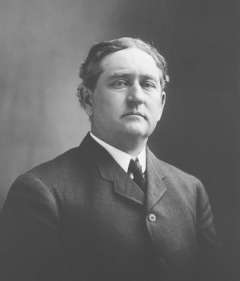
Merris C. Barrow, editor and proprietor of Bill Barlow's Budget in early Douglas, Wyo., worked hard, boosted his young and growing community, succeeded with his newspaper where others had failed and reached beyond his current achievements to accomplish even more. After the Budget had been in business nearly 20 years, Barrow began a monthly magazine, eventually reaching an international audience with this engaging compendium of news, commentary, aphorisms, essays and opinion pieces. All these writings seemed spoken in his unique tone: the voice of a didactic imp.
Youth, education and early career
Born Oct. 4, 1857, in Canton, Pa., to Robert Barrow and Helen Harding Barrow, he grew up and was educated in Tecumseh, in southeastern Nebraska, where his parents settled in 1867. Nine years later, he leased and edited the Tecumseh Chieftain, and on March 17, 1877, during this approximately two-year tenure, he married Minnie Florence Combs.
Sometime in 1878 Barrow was appointed U.S. postal clerk, responsible for a run from Sidney, Neb., 140 miles along the Union Pacific line to Laramie, Wyo., where he lived with his wife and their first child, Elizabeth. A charge of robbing the mail cost him his job, but the jury found him not guilty. Records of the trial have not survived. Years later, Barrow defended himself, claiming that a fellow clerk had framed him. Even while his trial was in progress, he accepted a position as compositor and reporter for the Laramie Daily Times. Right after his acquittal, he became city editor of the Times. For the rest of his life, Barrow was a journalist.
In 1881 he began working for the new Laramie Boomerang, alongside famed Wyoming humorist Bill Nye, who was managing editor. Later that year, Barrow himself rose to city editor and, when Nye became ill during the winter of 1882-83, Barrow became editorial writer. In September 1884 he took over the editorship and business management of the (Rawlins) Wyoming Tribune. All this was excellent preparation for owning and managing his own newspaper.

Bill Barlow's Budget
In early 1886 the Barrows moved to Fetterman, Wyo., on the south bank of the North Platte River at the mouth of La Prele Creek in east central Wyoming, in what soon would become Converse County. Fetterman was the site of old Fort Fetterman, abandoned in 1878 by the U.S. military. Even before 1886, settlers had begun to arrive, and as the Fremont, Elkhorn and Missouri Valley Railroad approached from its terminus in Chadron, Neb., people flooded Fetterman and the future site of Douglas, about eight miles to the southeast.
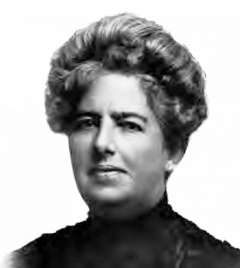
On June 9, 1886, Barrow published the first issue of Bill Barlow's Budget, a weekly. He had set up his equipment in a small shed in Fetterman that later became a chicken coop; it must have been dusty, cramped and ill lit. By August the Budget had moved to a lumber shack in booming North Douglas, a tent town where several hundred merchants and citizens had already camped, awaiting the railroad company's permission to build on the official Douglas townsite.
In his first issue, Barrow wrote, "The Budget will sit on the fence 'politically,' and throw stones at whoever and whatever it pleases. … It is in no sense the organ of any party or private interest in politics, in religion, or in anything else." This issue also contained more than two pages of news shorts, such as obituaries, accounts of crimes and reports on the progress of the railroad. Some of these were as much opinion as news, for example, "Fetterman needs reliable telegraph communication with the outside world almost as badly as it needed a newspaper before The Budget came in."
In the first half of September, after the arrival of the railroad, the Budget moved again, this time to a more substantial building on Third Street in Douglas. During the next 14 years, Barrow added to his printing equipment both for the Budget and for outside jobs. He expanded his paper from six to 12 pages, continued to boost Douglas and became one of its leading citizens.
It seemed there was hardly a project Barrow did not participate in. He served on the town's first school board in late 1886; helped establish the Douglas Club, an organization of business and professional men; and joined the Douglas Gun Club and the Douglas Whist Club. "Mrs. Bill," as Barrow invariably referred to his wife, was president of the Douglas Social Club, a women's organization. As various lodges were established, such as the Knights Templar, the Mystic Shrine and the Eastern Star, Barrow seems always to have been in the thick of these plans.
Through his paper, Barrow called for mail service in the Fetterman country even before railroad officials had revealed the location of future Douglas. He encouraged merchants to settle in the area, advocated for civic fire protection in June 1887 after the town’s first fire, and a year later suggested a city water system. By 1901-02 he was calling for a sewer system and reported on the progress of telephone service into Douglas.
With all this community involvement, it's not surprising that politics came next.
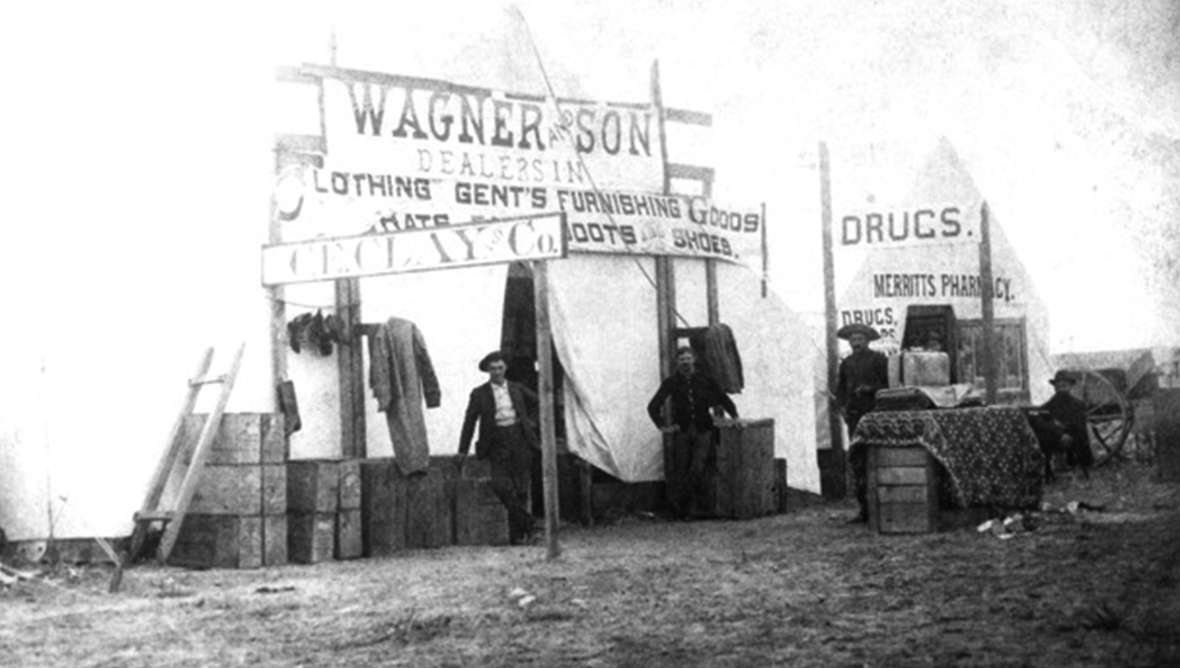
Public office and politics
On June 8, 1887, the city of Douglas incorporated. Barrow became clerk of the city council, a post he held nearly two years. During the second year he was also city assessor. On May 13, 1890, he was elected mayor, serving one term. In 1890 he also became receiver of the U.S. Land Office, accepting payments for federal land and issuing receipts.
As Wyoming approached its debate on statehood and a new state constitution in the summer of 1889, Barrow decided the fence-sitting policy he’d adopted at the start of the Budget was no longer appropriate.
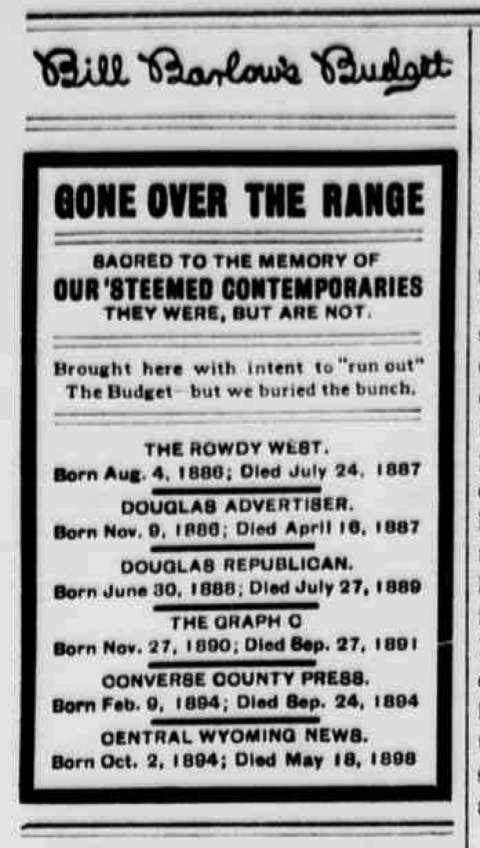
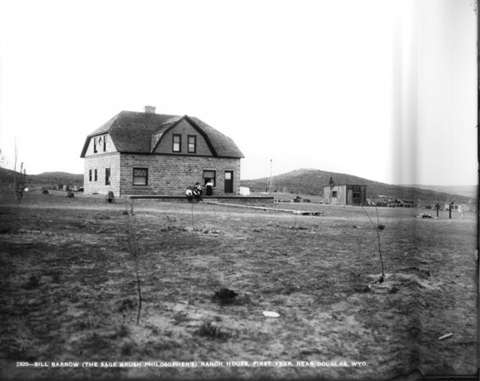
"Thus far The Budget's political policy has been that of an independent newspaper … uninfluenced by threats or offers of boodle," he wrote on page four of his June 5, 1889, issue. Mentioning the prospect of statehood for Wyoming, he continued, "[A]n independent newspaper is out of place where national questions may be discussed. … The Budget, therefore is henceforth a republican newspaper."
Late that summer, he attended the state’s constitutional convention, and reported on the proceedings in his unique tone and style:
"As a matter of fact the work should have been concluded a week or ten days ago; and it would have been, were it not for the fact that there are a half-dozen or more talented gentlemen in the body each of whom seems to be a sort of a Jack-in-the-box. Every once in a while—oftener in fact—the catch which holds these gentlemen down slips off and they bob up and shake their gory locks at the convention. The gentleman from Gander Creek moves to amend by inserting the word 'tweedle dee' after the seventh word in line four of section ten. Then the gentleman from Jawbony moves to amend the amendment by substituting the word 'tweedle dam' in lieu thereof. Then the catches slip off all over the house and a general discussion follows."
As chief clerk of the Wyoming House of Representatives in the 1894 and 1896 legislative sessions, Barrow reported the proceedings in detail. In 1896 he was secretary of the Republican state convention in Sheridan, Wyo., and was chosen alternate delegate to the national Republican convention in St. Louis. Ever the community booster, he worked with Converse County state senator and future Wyoming Gov. DeForest Richards to bring the 1898 Republican state convention to Douglas, and succeeded.
In the years 1886-1898 the Budget stayed in business while six other newspapers in the Douglas area failed. Not only did the Budget prosper; Barrow sometimes published extra issues, sending them out free, as he did during the 1888 election season.
Meanwhile, Barrow continued to develop his amusing, often pugnacious, style. One of the paper’s most engaging features was a regular column of brief quips like these from page two, May 21, 1902: "The man who kicks himself for having made a fool of himself only adds insult to injury." And "The distressing news comes from Atlanta that a youngster of that city swallowed a ping-pong ball and the physicians had to work several hours before the game could be resumed."
Though these may be old standards re-invented, there's no doubt Barrow’s jokes added to the Budget's appeal. Eventually it occurred to Barrow that he could create an additional platform for his wit, political commentaries, general opinions and outlook on life.
The sagebrush philosopher
On December 9, 1903, Barrow wrote in the Budget, "I am about to launch a monthly magazine—the which [sic] will face the footlights early next month. … It will comprise stuff written only to be read." The phrase, a favorite with Barrow, summed up his literary convictions: If you expect people to read what you write, write something they want to read. The pages of Sagebrush Philosophy bear this out.
For example, the September 1905 issue includes a barbed commentary on steel tycoon Andrew Carnegie's then-current project of financing community library buildings throughout the nation. "His benevolence is a bluff—his love for his fellows rank egotism," wrote Barrow. "If honest in his professed desire to benefit mankind, why not divide a few [dollars] with the poor devils whose daily toil maintains his troublesome bank balance?"
In the same issue is an amusing account of a tenderfoot who was taken in by a fake gunfight yet later failed to realize he was in actual crossfire outside a Casper, Wyo., saloon. The man failed to take cover. Barrow concluded, "[T]hanks to a [mistaken] state of mind he had been the bravest man in town—for about a minute!"
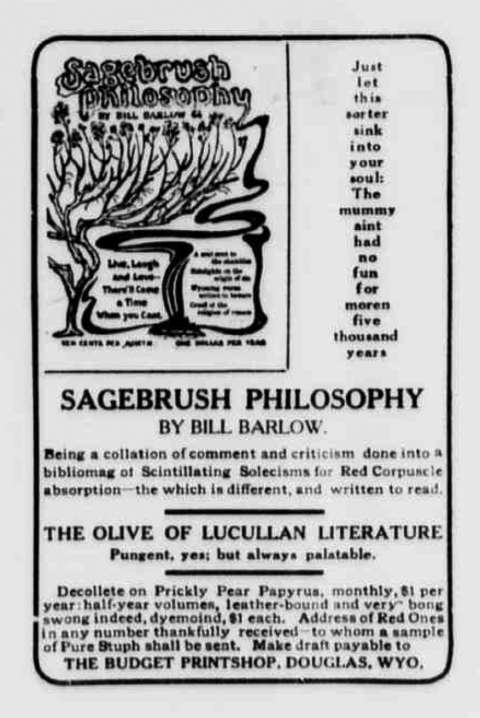
Another essay, on the "mutton-head," further illustrates Barrow's timing. "You know who I mean," he wrote, "the man whose mind is dormant, or missing … who never learns to think and act for himself and only does what he is told to do and like as not never does that well. … We meet him every day," Barrow wound up, "but never in an automobile of his own."
Barrow became known for his folksy style, in which he misspelled words on purpose, used slang or left apostrophes out of contractions. He often used the phrase "pure stuph," for example, to describe his writing, and preceded the first essay in each issue of Sagebrush Philosophy with the carpe-diem warning, "Just let this sorter sink into your soul: The mummy aint had no fun for moren five thousand years."
The magazine caught on; readers liked it and Barrow promoted it with vigor. He wrote to major news agencies, among them the American News Company in New York and its Colorado branch; the Washington News Company, which also had a branch in Colorado; and the Railroad News Company in Boston. He corresponded with individual newsstand operators nationwide as well, sending free samples whenever possible. His correspondence shows different claims about how many copies he'd printed of his first issue: Two thousand are mentioned in one letter, 5,000 in another.
On Jan. 13, 1904, Barrow reported in the Budget that the Chicago Inter-Ocean newspaper had given his magazine a favorable review. Also that first year of publication, readers wrote to Barrow from Florida, Pennsylvania, Iowa, California, Texas, Illinois, Nebraska, Georgia, Colorado, New York, Massachusetts and Kentucky, as well as Canada, Nassau and the Bahamas. Readers and reviewers compared Barrow favorably with two other contemporary magazine editors, Elbert Hubbard of the Philistine, published in Georgia, and William Cowper Brann of the Iconoclast, published in Texas. Barrow's subscription base is difficult to verify, but in his Budget of May 31, 1905, he claimed that recent orders would boost his circulation to 15,000 by July.
A cloud appeared early in 1905 when an unknown person wrote to the General Land Office, as it was then called, accusing Barrow of fraud in his capacity of receiver. Barrow had held that position since 1890, with one interruption from 1894-1897 (most of Democratic President Grover Cleveland's term). Through two years of correspondence with officials at the GLO, Barrow asserted his honesty and accused R. F. Potter, Jr., a clerk, of failing to account for $230.00 in fees. Barrow and A. D. Chamberlin, register in the Douglas Land Office, paid the shortfall. Nonetheless, both men were dismissed in early February 1907.
This was the second time in Barrow's life that he had been accused of fraud. Perceptions of his integrity and his public standing appear not to have changed much at the time, however. On both occasions, for example, his longtime friend and colleague in the newspaper business, W. E. Chaplin, editor of the Laramie Republican, defended him publicly.
Yet decades later, in the late 1940s, when historian Margaret Prine was writing two long articles about Barrow for the Annals of Wyoming, Chaplin felt free to express franker feelings about his old friend’s personal traits. In a letter to Prine, Chaplin wrote
Socially Barrow did not stand high. He was quite generally known as a philanderer. He embraced vice in nearly all its hideous forms. . . . At Douglas he belonged to a small coterie that played poker at each other’s homes. He enjoyed going over to Deadwood [S. Dak.], where vice was considered a virtue and gambling and prostitution were leading industries.
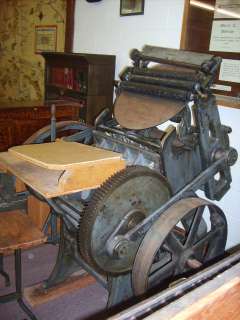
Prine also noted a “general impression” among people in Douglas, continuing down to her time though only indirectly expressed, “that Barrow had a reputation for worldliness and even ‘wickedness,’ which shocked some of his more upright neighbors, and that this reputation took form largely in his later years.” Prine was also careful to note that regardless of judgments like these, Barrow was clearly “a man of many friends, an influential editor, and a tireless worker for local and state enterprises in which he believed.”
And Bill Barlow's Budget prospered. Though some items in Sagebrush Philosophy were lifted, by intent, from earlier issues of the Budget, Barrow worked harder as the years went by to generate new content for the magazine while still publishing the Budget every week. Perhaps this is part of the reason he died of heart failure at just 53, on Oct. 9, 1910.
After his death, two more issues of Sagebrush Philosophy were published. In July 1911, Minnie Barrow, "Mrs. Bill," published The World of Just You and I, a collection of past articles from Sagebrush Philosophy. The title is from a verse of Barrow's by the same name. Minnie Barrow also published the Budget through most of 1914. With the issue of Dec. 10, 1914, the paper became the Douglas Budget and has continued under that name up to the present, through a variety of owners and editors.
There's no doubt that Barrow was a financial success. In 1890 he and his wife built a $1,500 residence on Fifth and Center Streets in Douglas, and later they built a large ranch house near town west of the North Platte River. Friends also recalled that Barrow drove "a good team of horses." Although Bill Barlow's Budget and Sagebrush Philosophy could not have lasted long without the author's wit and originality, modern readers still have access to his mind and imagination—and to the times and culture he lived in—through the writings he left, "written to read."
(Editor’s note: Publication of this and seven other articles on Wyoming newspapering is supported in part by the Wyoming Humanities Council and is part of the Pulitzer Prizes Centennial Campfires Initiative, a joint venture of the Pulitzer Prizes Board and the Federation of State Humanities Councils in celebration of the 2016 centennial of the prizes. The initiative seeks to illuminate the impact of journalism and the humanities on American life today, to imagine their future and to inspire new generations to consider the values represented by the body of Pulitzer Prize-winning work. For their generous support for the Campfires Initiative, the council thanks the Andrew W. Mellon Foundation, the Ford Foundation, Carnegie Corporation of New York, the John S. and James L. Knight Foundation, the Pulitzer Prizes Board, and Columbia University.)
Resources
Primary Sources
- Adelman, Matt, publisher, Douglas Budget. Personal emails to the author, Aug. 5, 2016.
- Barlow, Bill. Sagebrush Philosophy 2: 9, Sept. 1905, Western History Center, Casper College, Casper, Wyo. (hereafter WHC)
- __________. Sagebrush Philosophy 3: 1, Jan. 1906, WHC.
- __________ . Sagebrush Philosophy 12: 6, Dec. 1909, WHC.
- Barrow, Minnie F., ed. The World of Just You and I By "Bill Barlow." Douglas, Wyo.: Mrs. Minnie F. Barrow, 1911. Accessed Sept. 7, 2016, at https://archive.org/details/billbarlowsbook00barrgoog.
- Wyoming Newspapers. Accessed July 23, 2016, Aug. 3, 2016, Aug. 9-10, 2016, via http://newspapers.wyo.gov/, Bill Barlow's Budget, June 9, 1886, June 5, 1889, Sept. 25, 1889, May 21, 1902, Feb. 18, 1903, Dec. 9, 1903, Jan. 13, 1904, May 31, 1905, Dec. 13, 1905, June 12, 1907, Sept. 29, 1909.
Secondary Sources
- McInnis, Doug. "Converse County, Wyoming." Accessed Aug. 9, 2016, at /encyclopedia/converse-county-wyoming.
- Prine, Margaret. "Merris C. Barrow: Sagebrush Philosopher and Journalist, Part I." Annals of Wyoming 24: 1, Jan. 1952. Accessed Sept. 7, 2016, at https://archive.org/stream/annalsofwyom24121952wyom#page/n0/mode/2up.
- ____________. "Merris C. Barrow: Sagebrush Philosopher and Journalist, Part II." Annals of Wyoming 24: 2, July 1952, pp. 3-72. Accessed Sept. 7, 2016, at https://archive.org/stream/annalsofwyom24121952wyom#page/n105/mode/2up/search/Margaret+Prine. W.E. Chaplin’s comments about Barrow are on p. 13.
- United States Bureau of Land Management. Records of the Bureau of Land Management, Record Group 49. "Records of District Land Offices 1800-1980," 49.9. Accessed Sept. 6, 2016, at http://www.archives.gov/research/guide-fed-records/groups/049.html.
For Further Reading and Research
- Bill Barlow's Budget, Wyoming Newspapers, http://newspapers.wyo.gov/: Most weekly issues, June 9, 1886-Dec. 3, 1914.
- Sagebrush Philosophy, Wyoming State Archives, Cheyenne, Wyo.: All monthly issues, Jan. 1905-Nov. 1910.
- Sagebrush Philosophy, Casper College Western History Center, Casper, Wyo.: Sept., Dec. 1905; Jan. 1906; all monthly issues, Jan. 1907-Dec. 1909.
Illustrations
- The photos of Barrow, his ranch house and Douglas in its tent-town phase are from the Wyoming State Archives. Used with permission and thanks.
- The portrait of Minnie Barrow is from the frontispiece of The World of Just You and I, which she published in 1911, the year after his death. The book is available electronically at archive.org; used here with thanks.
- The newspaper images are from the June 12, 1907 edition of Bill Barlow’s Budget, available at Wyoming Newspapers. Used with thanks.
- The photo of the C&P press is from the Wyoming Pioneer Memorial Museum, with special thanks to Jenna Thorburn.
